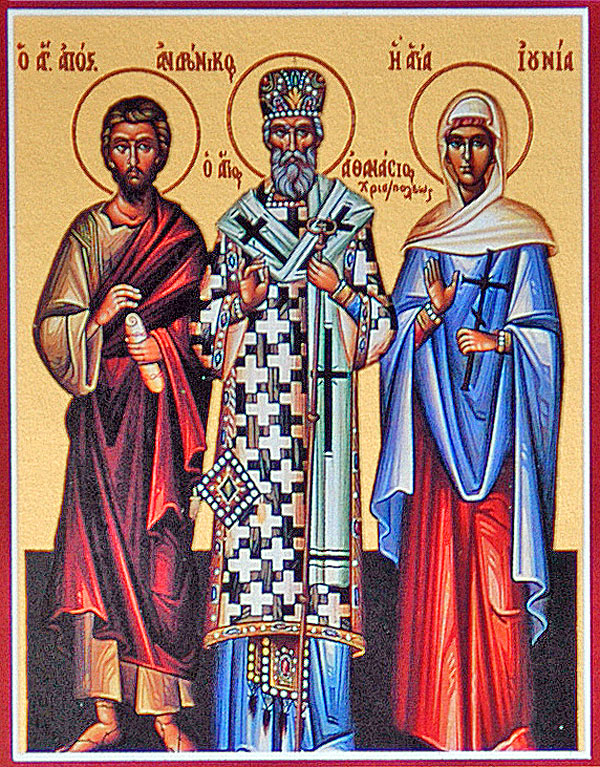

The holy apostle Andronicus was one of the Seventy apostles. He and his companion Junias were kinsmen of St. Paul, as he mentions in Romans 16:17. St. Andronicus was Bishop of Pannonia but still he traveled preaching the gospel with Junias, bringing the word of God to pagans. Many pagans temples were closed and Christian churches opened in their stead. Andronicus and his companions were martyred for the Faith.
O holy apostles, intercede with the all-merciful God that He may grant is forgiveness of our sins.
We praise Andronicus, the apostle of Christ, the bright star who enlightened the pagans with understanding of God. We also praise Junias who labored along with him in bringing the Gospel to the pagans. We cry out: Implore God for us unceasingly.
Acts 18: 22-28
In those days, Paul landed at Caesarea. He went up and paid his respects to the congregation, and then went down to Antioch.
After spending some time there he set out again, traveling systematically through the Galatian country and Phrygia to reassure all his disciples.
A Jew named Apollos, A native of Alexandria and a man of eloquence, arrived by ship at Ephesus. He was both an authority on scripture and instructed in the new way of the Lord. Apollos was a man full of spiritual fervor. He spoke and taught accurately about Jesus, although he knew only of John’s baptism. He too began to express himself fearlessly in the synagogue. When Priscilla and Aquila heard him, they took him home and explained to him God‘s new way in greater detail. He wanted to go on to Achaia, and so the brothers encouraged him by writing the disciples there to welcome him. When he arrived, he greatly strengthened those who through God‘s favor had become believers. He was vigorous in his public refutation of the Jewish party as he went about establishing from the Scriptures that Jesus is the Messiah.
John 12: 36-47
The Lord said to the people coming to him: “well you have the light, keep faith in the light; that you will become sons of light.” After this utterance Jesus left them and went into hiding.
despite his many signs performed in their presence, they refused to believe in him. This was to fulfill the word of the prophet Isaiah: “Lord, who has believed what has reached our ears? To whom has the might of the lord been revealed?” The reason they could not believe was that, as Isaiah says elsewhere: “He has blinded their eyes, and numbed their hearts, less they see or comprehend, or have a change of heart — and I should heal them.” Isaiah uttered these words because he had seen Jesus’ glory, and it was of him he spoke.
There were many, even among the Sanhedrin, who believed in him; but they refused to admit it because of the Pharisees, for fear they might be ejected from the synagogue. They preferred to praise men to the glory of God.
Jesus proclaimed aloud: “Whoever puts faith in me believes not so much in me as in him who sent me; and whoever looks on me is seeing him who sent me. I have come to the world as it’s light, to keep anyone who believes in me from remaining in the dark. If anyone hears my words and does not keep them, I am not the one to condemn him, for I did not come to condemn the world but to save it.”
Icon courtesy of Jack Figel, Eastern Christian Publications – ecpubs.com
Tuesday, May 16 –